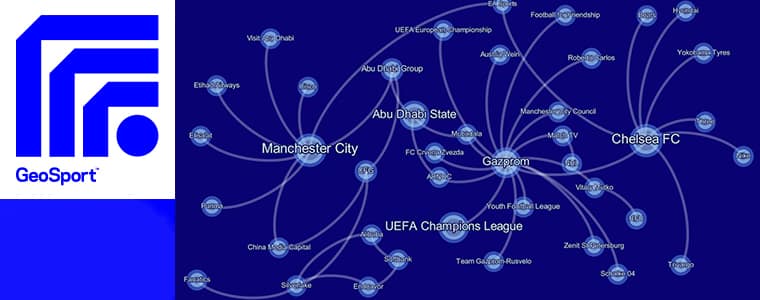25.07.2024
The Energy-led Geography of UEFA’s Champions League Final
Tribune
28 mai 2021

For the second time in three years, the UEFA Champions League Final (which is about to be staged in Portugal) will again be contested between two English clubs. As in 2019, this is another North-South battle, this time with Manchester City taking on London’s Chelsea. Previously, the capital city’s Tottenham Hotspur faced Liverpool (a game played in Spain).
The Iberian peninsula also hosted the 2020 Champions League Final when, in the midst of the pandemic, it was switched to Lisbon. Last season’s concluding match was, however, a very different one to that which had preceded it and the one due to follow it – not least because there were no fans present inside the stadium due to Corona virus precautions. The loser in all of this has been Turkey, which was scheduled to host first the 2020 game and then this season’s edition, with the pandemic causing a re-think on both occasions.
Despite some obvious similarities, all three finals are actually very different. Liverpool’s win in 2019 was a triumph for its North American owners, the Fenway Sports Group which owns the Boston Red Sox baseball franchise. Meanwhile Tottenham Hotspur, although British owned, draws many of its moves from the playbook of North American sports capitalism. For instance, its new stadium is an identikit of US sports venues, indeed it hosts NFL games.
By contrast, the 2021 Champions League Final will involve teams with owners from very different backgrounds. Roman Abramovich, a Russian oligarch with close links to the Russian government and a personal wealth partly derived from the energy sector, owns Chelsea. At City, the main shareholder is an Abu Dhabi state investment vehicle, its wealth similarly derived from the country’s immense energy reserves.
The same is true of Paris Saint Germain, the competition’s runner-up in 2020, which is owned by a Qatari state entity. Qatar is one of the richest countries in the world on a per capita basis, its wealth derived from liquified natural gas and petroleum deposits. PSG’s opponents from last year are rather different to the other teams. Germany’s Bayern Munich is a majority supporter owned club, its ownership structure dictated by the country’s 50+1 Rule, which ensures that fans retain ownership control over their club.
Significantly, all four of the English clubs in question were part of the recent proposed, though ill-feted, European Super League; PSG and Bayern were not. From the outset, the French club had been vocal in its support for UEFA. It was thus no surprise that in the immediate aftermath of the ESL debacle, PSG’s president – Nasser Al-Khelaifi – was re-elected as a UEFA Council member which followed on from his elevation to the presidency of the European Clubs Association. And somewhat predictably, Qatar Airways remains as a UEFA sponsor.
As for Bayern, the Bavarian club has always stayed close to UEFA, not least through their common associations with sportswear brand Adidas. At the same time, both organisations harbour egalitarian ideals, although cynics nevertheless argue that Bayern has fallen so far behind its rivals (in commercial and financial terms), that it looks to the governing body of European football for protection.
The reaction of Chelsea and Manchester City to the announcement that a Super League would be established is, however, perhaps the most intriguing aspect of what happened to the proposed breakaway. After three years of planning, within twenty-four hours of the ESL news leaking, first Chelsea and then shortly afterwards City confirmed that they wouldn’t be taking part in it.
Soon after, the entire project crumbled with several other clubs announcing their intention to follow suit and withdraw. This has inevitably raised the question, why? According to the German media, it appears that Russia’s Vladimir Putin had called Roman Abramovich, advising him that it would not be in the country’s interest for the Super League to go ahead. Indeed, with the football world in a state of ESL uproar, perhaps few noticed two key (and probably unrelated) developments.
Firstly, the president of Russia’s Football Union, Alexander Dyukov, became a UEFA Executive Council member. Secondly, the country’s state energy company Gazprom became a major sponsor of UEFA properties, adding to its existing deal as a sponsor of the Champions League itself. This raises all manner of issues, as it appears to put Gazprom centre-stage in a network of relationships that are underpinned by the politics and economics of energy.
When visualising this network (see below), we noticed several things. For instance, that Alexander Dyukov had been a previous Chairman of Gazprom. The visualisation also reveals that Abu Dhabi has close links to Gazprom, including collaborative work on a number of strategic energy projects. As such, the state-owned ADNOC – Abu Dhabi National Oil Company – and Mubadala (Abu Dhabi’s sovereign wealth fund) are both closely allied with the Saint Petersburg-based state-owned Russian energy giant.
It is interesting as well that Vladimir Putin is a native of Saint Petersburg. Putin’s reported ESL intervention is therefore likely to have impacted not just on Gazprom, but also potentially on Abu Dhabi. All of which brings a sense oil and gas fuelled irony to this season’s UEFA Champions League Final.
Whilst much has been made in recent months of a US private equity takedown of European football, a Chelsea versus Manchester City is a reminder that Western investments in do not have things all their own way. Certain governments remain kingmakers, even an era of money and commercial gain in football. And underpinning their influence, there is often an inevitable well of oil and gas powering tournaments, their sponsorships, and the teams that play in them.
—————–
This article belongs to the GeoSport platform, developed by IRIS and EM Lyon.